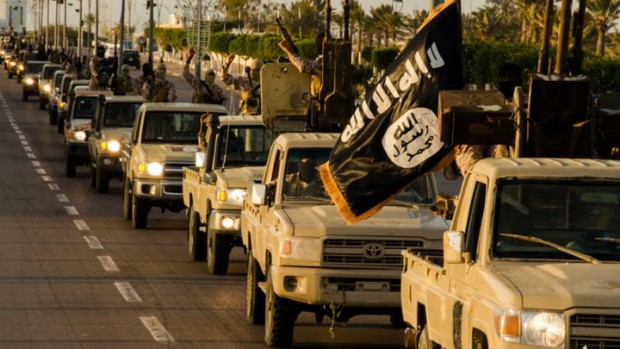UN says ISIS is expanding its control areas in Libya

The political and security vacuum in Libya is being exploited by the Islamic State group which has “significantly expanded” the territory it controls in the North African nation, said a UN report released Thursday.
The experts monitoring UN sanctions against Libya said the militant group has successfully recruited marginalized communities in the central city of Sirte, which it controls. It has also increased its operational capacity in the city of Sabratha and the capital Tripoli through local recruitment reinforced by foreign fighters, the experts said.
“While ISIL does not currently generate direct revenue from the exploitation of oil in Libya, its attacks against oil installations seriously compromise the country’s economic stability,” the six-member panel said in the report, using an alternate acronym for the IS group. “Libyans have increasingly fallen victim to the terrorist group’s brutalities, culminating in several mass killings.”
Libya has effectively been a failed state since the 2011 ouster and death of longtime dictator Muammar Gaddafi, which led to the country’s military collapse and fragmentation by powerful militias.
Since 2014, an internationally recognized government has convened in the far east of the vast, oil-rich country while a rival Islamist government is based in Tripoli. The UN has been trying to help forge a unity government to revive services to millions of people and confront IS group extremists.
According to the experts, Libya has become increasingly attractive to foreign fighters and their presence in the south “is symptomatic of the regional dimension of the conflict”. It added that countries in the region have been providing political support – and possibly more – to various groups, further fueling the continuation of fighting.
The experts said in the report to the UN Security Council that all parties in the conflict are continuing to receive illicit arms transfers, some with support from UN member countries.
These weapons are not only influencing the instability but are having “a negative impact on the security situation in Libya and its political transition”, the report said.
The experts called for the arms embargo — which allows the government to seek exemptions — to remain in place and be enforced.
As for the financing of Libyan armed groups, the report said, “government salaries are continuing to be paid to enlisted combatants, regardless of their human rights record or their ties with spoilers or terrorist groups”.
The experts said armed groups and criminal networks in Libya have further diversified their sources of financing, including through kidnapping and smuggling migrants, oil products, subsidized goods and profits from foreign currency exchange schemes.
EU prepares sanctions against Libyan ‘spoilers’
Meanwhile, the EU is preparing possible sanctions against officials in Libya blamed for undermining the peace process and blocking the formation of a unity government.
EU diplomats say a small list of “spoilers” could be targeted as soon as next week. The diplomats declined to be named because the process is sensitive and ongoing.
Unconfirmed reports suggest Nouri Abu-Sahmain, head of the Tripoli parliament, and Khalifa Ghweil, prime minister of the Tripoli Salvation government, could be in the EU’s sights.
EU foreign ministers will hold informal talks on Libya in Brussels on Monday. Because their talks are informal, no legal decisions to impose sanctions can be taken, the diplomats explained, but a process for a decision will be agreed on when member states are ready.
UN Libya envoy Martin Kobler will brief the ministers on recent developments.
Britain and France are driving the sanctions effort, but the move has broad support among other nations in the 28-country bloc, one diplomat said.
Other countries would like the move coordinated more closely with the United Nations.
“Because of the dynamics in the UN Security Council, UN imposed sanctions talk didn’t go anywhere,” said Libya expert Carlo Binda.
But he noted that “carrots have worked only so far, and now the sticks are being prepared”, adding that EU sanctions would probably hurt the “spoilers”.
How to submit an Op-Ed: Libyan Express accepts opinion articles on a wide range of topics. Submissions may be sent to oped@libyanexpress.com. Please include ‘Op-Ed’ in the subject line.
- Libya’s HCS invites applicants for key state roles - December 31, 2023
- UK calls on Iran to prevent escalation in Israel-Hamas conflict - November 05, 2023
- Libyan Interior Minister: Immigrant shelter costs a fortune - November 05, 2023


